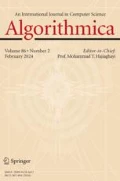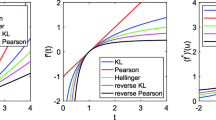Abstract.
In this paper we investigate data structures obtained by a recursive partitioning of the multi- dimensional input domain into regions of equal size. One of the best known examples of such a structure is the quadtree . It is used here as a basis for more complex data structures. We also provide multidimensional versions of the stratified tree by van Emde Boas [vEB]. We show that under the assumption that the input points have limited precision (i.e., are drawn from the integer grid of size u ) these data structures yield efficient solutions to many important problems. In particular, they allow us to achieve O(log log u) time per operation for dynamic approximate nearest neighbor (under insertions and deletions) and exact on-line closest pair (under insertions only) in any constant number of dimensions. They allow O(log log u) point location in a given planar shape or in its expansion (dilation by a ball of a given radius). Finally, we provide a linear time (optimal) algorithm for computing the expansion of a shape represented by a region quadtree. This result shows that the spatial order imposed by this regular data structure is sufficient to optimize the operation of dilation by a ball.
Similar content being viewed by others
Author information
Authors and Affiliations
Additional information
Received January 19, 1999; revised November 4, 1999.
Rights and permissions
About this article
Cite this article
Amir, A., Efrat, A., Indyk, P. et al. Efficient Regular Data Structures and Algorithms for Dilation, Location, and Proximity Problems. Algorithmica 30, 164–187 (2001). https://doi.org/10.1007/s00453-001-0013-y
Published:
Issue Date:
DOI: https://doi.org/10.1007/s00453-001-0013-y



